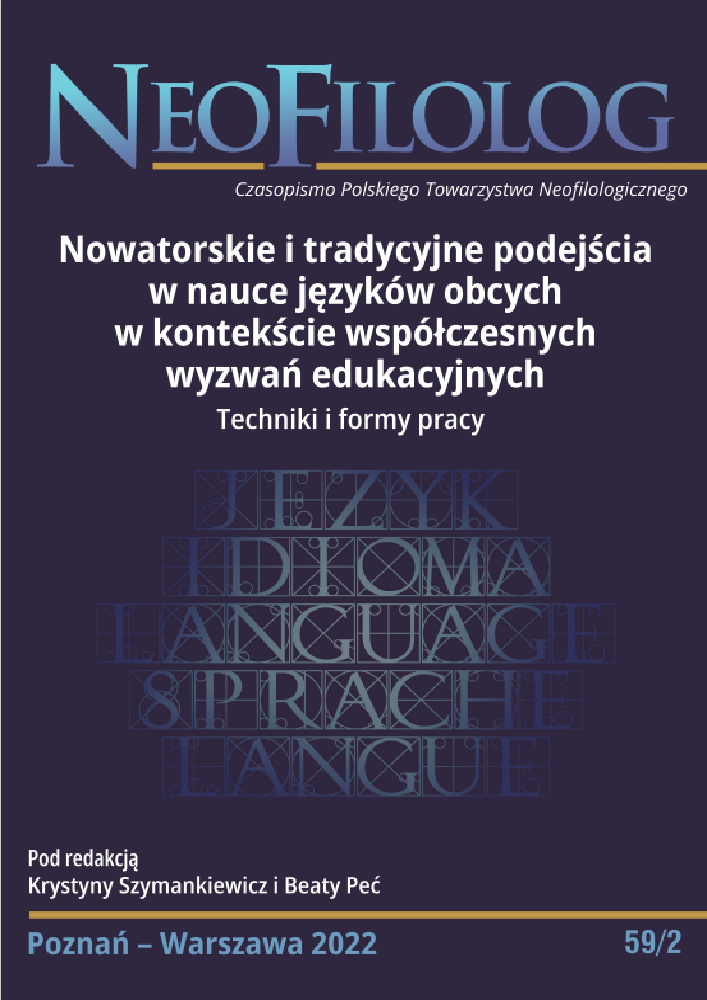Résumé
The global pandemic has forced changes in education. About 1.5 billion students worldwide have experienced school closures. The aim of the article is to present the results of the survey on teaching during coronavirus in secondary schools where the research group consisted of students and teachers. For many students and teachers, the new way of learning and teaching has been a great challenge and has caused many difficulties and has exposed deficiencies in education systems. During the research, the focus is on students, teachers, school principals and parents who had to find themselves in a new and tricky situation at school, which was distance learning. The research addresses aspects related to the situation, well-being and figure of students and teachers during the new virtual reality, methods of teachers' work in a virtual school, as well as the importance of principals and parents as a support for students and teachers during a global pandemic.
Références
Brash B., Pfeil, A. (2017), DLL 09: Unterrichten mit digitalen Medien. Stuttgart: Ernst Klett Verlag.
Chałubińska-Jentkiewicz, K. (2019), Rozwój nowoczesnych technologii w kontekście procesu stanowienia prawa na przykładzie strategii AI. (w:) „TEKA Komisji Prawniczej PAN Oddział w Lublinie“, t. 12, nr 2, s. 53–71.
Główny Urząd Statystyczny (2021), Oświata i wychowanie w roku szkolnym 2020/2021. Główny Urząd Statystyczny / Obszary tematyczne / Edukacja / Edukacja / Oświata i wychowanie w roku szkolnym 2019/2020.
Heba A. (2009), Nauczanie na odległość – wczoraj i dziś. „Nauczyciel i Szkoła“, t. 3–4, s. 145–152.
Juszczyk S. (2002), Edukacja na odległość. Kodyfikacja pojęć, reguł i procesów. Toruń: Multimedialna Biblioteka Pedagogiczna, Wydawnictwo Adam Marszałek.
Juszczyk S. (2021), Edukacja na odległość, (w:) Siemieniecki B. (red.), Pedagogika medialna. Warszawa: Wydawnictwo Naukowe PWN, s. 251–285.
Kmiecik G. (2021), E-wykluczenie - zagrożenie dla współczesnej edukacji. „Pedagogika Przedszkolna i Wczesnoszkolna“, t. 9, nr 2(18)/2021, s. 97–107. https://doi.org/10.4467/23537159PPW.21.021.15181
Kopciał P. (2013), Analiza metod e-learningowych stosowanych w kształceniu osób dorosłych. „Zeszyty Naukowe Warszawskiej Wyższej Szkoły Informatyki“, nr 9/2013, s. 79–99.
Szabłowski S. (2009), E-learning dla nauczycieli. Rzeszów: Wydawnictwo Oświatowe FOSZE.
Szadzińska E. (2021), Wykluczenie cyfrowe podczas pandemii Dostęp oraz korzystanie z internetu i komputera w wybranych grupach społecznych. Federacja Konsumentów.
Zubik M. (2008), Nowe technologie jako wyzwanie i zagrożenie dla prawa, statusu jednostek i państwa, (w:) Girdwoyń P. (red.), Prawo wobec nowoczesnych technologii. Warszawa: Liber, s. 37–50.
OECD (2001), Understanding the Digital Divide. Paris: OECD. https://www.oecd.org/digital/ieconomy/1888451.pdf#:~:text=As%20used%20here%2C%20the%20term%20%E2%80%9Cdigital%20divide%E2%80%9D%20refers,the%20Internet%20for%20a%20wide%20variety%20of%20activities. (Zugang online: 01.11.2022).
Licence
© Filip Myszka 2022

Ce travail est disponible sous licence Creative Commons Attribution - Pas de Modification 4.0 International.
Auteurs :
Les auteurs de textes acceptés pour publication dans la revue Neofilolog sont tenus de remplir, signer et renvoyer à l'adresse de la rédaction, un accord sur l'octroi d'une licence gratuite pour les œuvres, avec obligation d'accorder une sous-licence CC.
En vertu de cet accord, les auteurs des textes publiés dans la revue Neofilolog accordent à l'Université Adam Mickiewicz de Poznań une licence non exclusive et gratuite et permettent l'utilisation de la sous-licence Creative Commons Attribution-NoDerivatives 4.0 International (CC BY-ND 4.0).
Les auteurs se réservent le droit de disposer librement de l'œuvre.
Utilisateurs :
Les utilisateurs d'Internet intéressés ont le droit d'utiliser les œuvres publiées à partir de l'année 2017 sous réserve des conditions suivantes :
- reconnaissance de la qualité d'auteur - l'obligation de fournir des informations sur la qualité d'auteur, le titre, la source (liens vers l'œuvre originale, DOI) et la licence, ainsi que l'œuvre distribuée ;
- sans créer d'œuvres dérivées - l'œuvre doit être conservée dans sa forme originale, p. ex. les traductions ou les interprétations ne peuvent être distribuées sans le consentement de l'auteur.
Tous les textes publiés sont soumis au droit d'auteur.
Autres :
L'Université Adam Mickiewicz de Poznań se réserve le droit à la revue dans son ensemble (mise en page, forme graphique, titre, conception de la couverture, logo, etc.).
.

